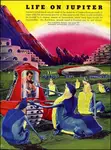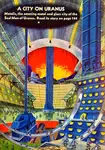- Home
- >
Tales unwritten
The Old Solar System has plenty of literary voids that need to be filled.
Mars has been well covered with tales. Venus, reasonably well thanks to Burroughs and Brackett. But as for the rest -
Mercury, despite its dramatic potential, has been strangely neglected - especially with regard to novels. Valeddom has recently plugged that gap, but we need more; either sequels to Valeddom or other contemporary retro authors taking a hand in Twilight Belt adventure. (Here's a thought for editors George R R Martin and Gardner Dozois: why not commission stories for an anthology to be titled "Old Mercury", to go alongside your excellent recent collections Old Mars and Old Venus?)
The Moon needs more, especially the ancient civilizations of the Moon - they're mentioned only in occasional tantalizing scraps and a very few short stories. On this site we have published two contributions to the theme - see The Archives of the Moon and The Mare Frigoris Culture.
The Sun - yes, we could even do with an epic about Solarians. Sundiver doesn't really get properly into it; that book is more about us. And it's too modern and realistic to count as an OSS novel anyway. We need a cheeky author who can invent some way of setting a swashbuckler on the Sun.
A rubble-zone close to the Sun would be a great scene for adventure: see The ESS.
The main-belt asteroids: here would be a great scene for adventure. An asteroid belt civilization. Or: stories set on the progenitor planet before it blew up. If only Clark Ashton Smith had finished Ascharia, or The Master of Destruction, which exist in fragments and synopses only. But even if he had we would also wish that he had written stories set entirely before the big blow-up; long before it, when the doomed world had many ages yet to live.
In fact one heck of a magnificent idea for an epic OSS novel would be the following:
A saga set in the ancient Solar System when the asteroid-progenitor planet is still whole, when that planet is home to a space-faring civilization that visits the other worlds, contemporary with a Lemurian or Muvian or Atlantean civilization on Earth which likewise sends out voyagers and adventurers. You could have a Leigh Brackett level of colour and excitement extending over the entire System. She does indeed mention the ancient Quiru "who are lords of Space and Time", but they are a haunting rather than a full-in-face presence, except for Rhiannon himself, in The Sword of Rhiannon (a novel which takes us back to an ancient sea-girt Mars). See also the page on primordial worlds.
One great modern discovery which could also be retroactively recruited into the OSS is the second asteroid belt, the icy Kuiper Belt in the solar system's outermost reaches. Settings could include these worlds plus one or more trans-plutonian planets. See the discussion in The Theoretical Ninth Planet.
Getting back to the main Asteroid Belt: forgetting about a progenitor planet, one might concoct an epic about the little worlds as they are, maybe accepting that they have always been that way, and speculating that life has can spread from one of them to another, by waiting for rare close encounters in order to leap across... (For more on this see the Diary, The Rocky Main).
Now let's get onto the giant planets: terrific potential here. Imagine if Burroughs had written sequels to Skeleton Men of Jupiter and fixed them up into a book, as he did with other novellas with great success towards the end of his life. I don't suggest that anybody finish the book for him. But imagine how great a feast for the reader, if someone could set an epic series on the old Jupiter-with-a-solid-surface, or Saturn, Uranus, Neptune... (In Uranian Gleams and Uranian Throne a start has been made with Uranus.) A giant world with oases of life separated by enormous distances could allow the scenario of an analogy of space exploration on a planetary surface: voyages of discovery between unrelated biomes.
Gravity being the big issue here, one motive for Terran bio-engineering efforts to colonize (say) Jupiter might be if all the low-gravity worlds were already monopolized by Martians who have achieved space travel long before we did... see the discussion in Humanity's Place in the OSS.
Incidentally there's a clue in Farmer in the Sky concerning Jupiter's North Pole. There might be a gap in the clouds at that pole - a visible way down to the surface!
And the Jovian system as a whole, with its four big moons, is particularly promising. Imagine if you had an epic of the Galilean Satellites in the Jovian past: a fiery early Jupiter radiating life-giving heat to primordial Io, Europa, Ganymede and Callisto, with civilizations on all of them.
There's a certain giantness about Earth, too, the multi-planar Earth, shimmering with dimensional possibilities, alternate historical lines, Kroth-type aspects reaching into other universes... The writer has yet to appear who can knit together previous literary achievements into a System-wide scene with this augmented Earth positioned among her fellow-worlds. The Earth need not be the Earth of nowadays; one could imagine a Pangaean civilization of the Permian period, say, coexisting with a multi-species System-wide civilization...
In the very ancient Solar System, so we now believe, the Earth-Moon pair was formed when a Mars-sized planet, dubbed Theia, collided with a larger planet in Earth-orbit. Well, as our correspondent Dylan has suggested, we could have tales set on Theia.
And we could have tales set on the larger planet - let's call it "Mearth" (because it contained material for Moon-plus-Earth). Mearth, before it was hit by Theia, might have had a career as an inhabited fiery world, peopled by an igneous race.
Finally, the planet which exists in legend but not in fact - Vulcan - could do with more attention. A novel or two in addition to what we have - Outlaw World is better than nothing but a bit skimpy on Vulcanian culture and history. For suggestions on how to do fuller justice to the place see Irresistible Vulcan and History of Hopes - The Hunt for Vulcan.
Leigh Brackett, The Sword of Rhiannon (1953); David Bryn, Sundiver (1980); Edgar Rice Burroughs, "Skeleton Men of Jupiter" (Amazing Stories, 1943); Robert Gibson, Valeddom (2013), Uranian Gleams (2015), and the Kroth trilogy (2013-15); Edmond Hamilton, Outlaw World (Captain Future, Winter 1946, reprinted as paperback 1968); Robert A Heinlein, Farmer in the Sky (1950); ed. George R R Martin and Gardner Dozois, Old Mars (2013) and Old Venus (2015); Clark Ashton Smith, "Ascharia" and "The Master of Destruction" (fragments / synopses), in Strange Shadows: the uncollected fiction and essays of Clark Ashton Smith (1989), also online at www.eldritchdark.com.
For story-ideas about ancient Mars, see the OSS Diary for 31st October 2016.
For unwritten "just so" style tales of the ancient OSS in general see the Diary for 30th October 2016. For ancient and future Jupiter see the Diary for 28th October 2016.
A suggestion for a volume entitled The Paul Narratives, that is to say, stories embodying the scenes in Frank R Paul's pictures, is made in the Diary, 26th November 2016.
For ideas concerning cyclical history epics, see the OSS Diary for 2nd March 2017.
For an idea about ancient Jovian gravitational pressure to prevent the accretion of a rival planet, see the OSS Diary for 26th March 2017.
For the as-yet unwritten Earth-Moon double-planet scenario see Poor Deadly Moonmen.
For the outermost reaches, see the Diary, Science Points the Way - Now Go and Play.
Also, For an unwritten tale of Planet X.
For "mind-over-space" shrinking the System and/or making it more habitable, see the Diary for 6th May 2017.
See the Diary, Ghostly Twitches from the OSS, for the idea of using the observed real-time events in the NSS as metaphhorically representative of events in an OSS-style parallel dimension. See also The LI, the LO and the LI-LO for commandeering real-life astronomical discoveries.
For the origins of asteroidal cultures see Digging for plots among the asteroids.
An under-exploited idea is lauded in Pockets of atmosphere. And again in Multi-genetic worlds.
See Norse Myth, Mercury and the Primodial OSS for a promising scenario.
For the Saturnian moon Hyperion see The Unchronicled World.
See the CLUFFs page for hints that could do with being followed up.
What tales would you like to be told?
Say what you think is the most urgent lack in the literature of the Old Solar System. You never know, if an author reads your comment, the gap might get filled - or some reader might bring the good news that it already is...





































